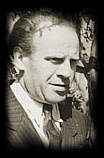
|
16A033 Ben's Value by Jim Davies, 9/13/2016
Having created unbacked paper "money", government now seems bent on destroying it. Here's a quick slide show about the virtues of cash. Item: towards the end of that amazing movie Schindler's List, everyone knows Germany is about to lose the war but nobody admits it. "Why should I do this?" he asks. Oskar Schindler [inset] replies "Allow me to show you the reason" and empties a small purse of diamonds on to the officer's desk and says "In the coming months, all of us are going to need some portable wealth." The bribe is accepted, the ladies are saved. Portable wealth, that's the ticket. After defeat, Germans used anything with practical utility, to serve as portable money in place of the worthless paper Reichsmark; notably cigarettes. Just as in America's prisons, today. Item: one of my favorite authors is Nevil Shute, and one of his novels that I first enjoyed many years ago is Trustee from the Toolroom. Britain - one of the victors in that awful war - was no better off, when it was over; wealth had been destroyed, and the government forbade the export of money. The story tells of a couple who decided to emigrate and take their savings with them, illegally; they did it by buying diamonds and hiding them in a box cemented in to the keel of their sailing boat, in which they set sail for a more congenial home. Sadly the ship foundered on a reef, and the book tells the tale of how their friend finds the wreck and recovers the treasure, for the benefit of their child. He has his own difficulties, in concealing it (successfully) from His late Majesty's Customs Inspectors. Item: a few days ago I caught ten minutes of a financial advice program on the car radio. Not sure, but it may have been put out by Fox. Two "experts" were telling listeners how best to put their money to work; but in those few minutes they said nothing except how needless it was to keep issuing $100 bills, when credit and debit cards will do all the buying any reasonable person needs to do, with $20s, $1s etc to take care of small purchases. They said this over and over, in different words, for the whole time I had the radio tuned. Clearly, they wanted the message to get across: Cash is Bad. Possibly, they were parroting the book by Kenneth Rogoff, The Curse of Cash, critiqued there by Theo Bishop of Mises.org.
Not once did these experts mention an opposing view, such as the idea that government is not the friend of any investor and loves to spy on everyone's use of money. Their powerful implication was that if anyone wants to keep his financial affairs private, he's up to no good. The exact opposite is the case, of course; the only money government cannot tax or otherwise grab is the kind it doesn't know is there. Any "financial adviser" who doesn't grasp that and encourage corresponding action is an enemy and should not be paid a dime for any advice he may offer. Understanding the value of cash is not sufficient to qualify anyone as a good financial adviser, but it's certainly a necessary prerequisite. It's important too in the present environment where banks, under government control, are not only failing to pay a sensible rate of interest on money they borrow (which customers deposit) but even charging them to lend it! - with a "negative interest rate." Now, that will make perfectly good sense in the coming zero government society when a bank will keep real money (such as gold and silver) safe from predators - it will be a useful service. But today, banks do no such thing. They will hand over your deposit to the IRS upon demand, and in all cases invest your money on their own account, at non-zero risk. Keeping more money in a bank than one can afford to lose is a chancy business. Cash (especially real money); portable wealth, under the owner's total control. What a splendid idea.
|
|
||||||||||||||||||||||||||||||||||||||||||

 An administrative snafu has diverted the ladies among Schindler's Jewish workers to Auschwitz instead of the factory intended, so he applies to the camp's commandant
An administrative snafu has diverted the ladies among Schindler's Jewish workers to Auschwitz instead of the factory intended, so he applies to the camp's commandant  Again and again, the broadcasters reminded us that there is "only one primary use" of $100 bills, often known as Benjamins, and that is to pack a large payment into a small suitcase, as is said to be done by drug merchants. So they associated cash with crime - and picked the crime (not
Again and again, the broadcasters reminded us that there is "only one primary use" of $100 bills, often known as Benjamins, and that is to pack a large payment into a small suitcase, as is said to be done by drug merchants. So they associated cash with crime - and picked the crime (not 








